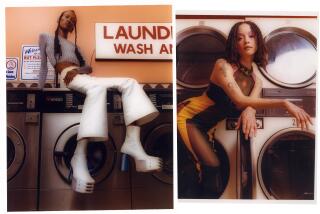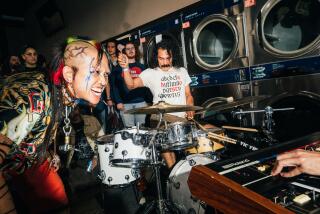AIDS Laundry Planned : Health: Organizers say volunteers will pick up, wash and return clothes for free for people with the disease.
- Share via
AIDS activists from Northeast Los Angeles and Hollywood plan to establish a free laundry service for people with the disease.
Aunt Bee’s, expected to be in operation by January, would be only the second program of its kind in the country, organizers claim. The proposed operation is modeled after Auntie Helen’s Fluff ‘n Fold, a nonprofit service in San Diego believed to be the only self-sufficient laundry service for people with AIDS or AIDS-related complex.
Aunt Bee’s most likely will operate from a rented building in Silver Lake or Hollywood, organizers said. Volunteers each week will pick up the laundry of about 500 men, women and children with AIDS, wash it at the building and return it for free, said Miki Jackson, a free-lance graphic artist and community activist who will serve as executive director.
A thrift store at the front of the building, small fund-raisers and private donations will pay for the service, Jackson said.
“As long as someone is healthy and well and able, they should do their own laundry and be responsible for their life,” she said. “But when they are too challenged and too ill, we want to be there to do it for them.”
At least 3,450 people in Los Angeles County have AIDS, according to the U.S. Centers for Disease Control. Many have more laundry needs because of night sweats, diarrhea and other problems associated with the disease, said Dr. Martin Finn, AIDS program medical director for the county’s Department of Health Services.
And although people with AIDS are encouraged to try to live a normal life at home, they may lose the energy or ability to do their laundry, Finn said.
“When you get down to it, it’s pretty hard to live when you don’t have your laundry cared for,” Finn said. “The illness, and its various ramifications, results in the use of a tremendous amount of laundry, so I don’t think one can underestimate how important it is to meet this need.”
Jackson and several others--including Morris Kight, a prominent gay activist who founded the Gay and Lesbian Services Center in Hollywood--started planning the service in September after touring Auntie Helen’s in San Diego.
That facility was founded in 1988 by Gary Cheatham, who quit his job as a computer analyst when he tested positive for the HIV virus, the precursor to AIDS.
Auntie Helen’s operates out of a rented building and washes 1,400 loads each month for about 200 people, Cheatham said. A thrift store in front pays for about 75% of the operation’s $12,500 monthly expenses, with biweekly yard sales and private donations making up the rest.
The operation’s three trucks, eight washing machines and eight dryers were donated, Cheatham said. About 70 volunteers do the washing and delivery.
Although some AIDS service groups have “buddy systems” in which a volunteer may wash clothing for an individual with AIDS, Auntie Helen’s is believed to be the only self-supporting, citywide program in the country specifically dedicated to washing laundry, Cheatham said.
The service also loans medical equipment, such as wheelchairs, and gives its clients clothing, linens and household goods, he said.
The proposed Los Angeles service will operate in nearly the same way--it will wash laundry and eventually will provide medical equipment and clothing--but it will require twice the number of washers and dryers to serve twice the number of people, Jackson said.
Aunt Bee’s initially will serve about 500 people under the corporate umbrella of the U.S. Missions, a nonprofit shelter in Hollywood that feeds senior citizens and the homeless. Eventually, it will become an independent, nonprofit organization serving up to 1,000 people, Kight said.
U.S. Missions already has donated office equipment and two businessmen donated $1,000. But organizers still are soliciting donations of washing machines, dryers and cars.
The organizers want to have the service running by January. They have decided to send out an Aunt Bee’s Christmas card to solicit donations and support, Kight said.
San Diego’s facility is widely considered a success, he said. A Los Angeles service probably will be more difficult to establish, Cheatham and Jackson agreed. San Diego has at least 900 residents with AIDS, compared with Los Angeles’ 3,450, federal statistics show.
Also, most San Diego users of the service live in the area of the UC San Diego Medical Center, which has an AIDS clinic, but Los Angeles residents are spread throughout the county--making pickup and delivery of clothing potentially more difficult, Jackson said.
More to Read
Sign up for Essential California
The most important California stories and recommendations in your inbox every morning.
You may occasionally receive promotional content from the Los Angeles Times.













